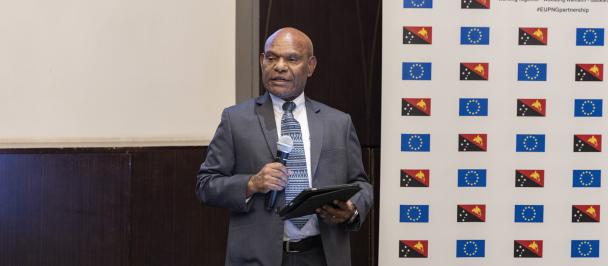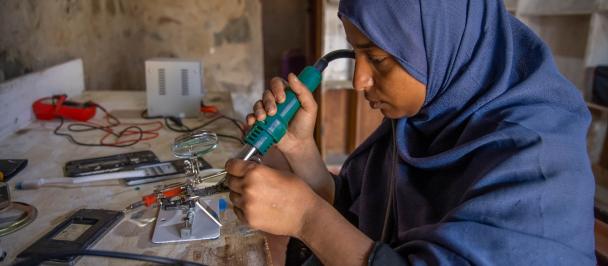Promoting Peace and Sustainable Income
Fostering Community Reconciliation and Reintegration Through Livelihood Opportunities
December 22, 2023

Women Briquette-Making Group
Promoting Peace and Sustainable income
In post-conflict societies, the pursuit of community reconciliation and reintegration is pivotal to rebuilding and fostering lasting peace. This journey encompasses a collective desire to move beyond the scars of conflict and coexist harmoniously. As such, ensuring that a successful reconciliation and reintegration framework exists can significantly alter the dynamics of conflict by conveying a potent message that diminishes support for violent extremist insurgency and advocates for peace.
Various models exist for reconciliation and reintegration, with one of the most impactful being livelihood support. By offering economic stability and opportunities, livelihood assistance becomes a potent instrument for enhancing social cohesion and alleviating tensions among diverse community groups.
UNDP through the Regional Stabilization Facility is helping vulnerable community across Damboa, Mafa and Ngala by providing them with livelihood opportunities. Providing community members with skills and equipment for micro gardening and briquette making not only empowers them but also provides them with long-term sustainable sources of income. These measures, when coupled with peacebuilding efforts, form the bedrock of an effective reintegration process which eventually contributes to the growth of local economies

Women making briquettes
"The introduction of briquette making to our community is a great blessing. It has saved us from the task of going into the bush in search of firewood and has encouraged peaceful coexistence within the community. Personally, I took it upon myself to teach other women who were not selected as beneficiaries, turning it into a bonding experience for us. We also sell some of the briquettes and use the proceeds to support our families."
Addressing Climate Change and Security Concerns
Addressing climate change and security are key under this project as a significant portion of conflict-affected communities, including returnees, host community members, and internally displaced people, heavily rely on firewood for energy. However, this practice comes at a substantial cost in terms of security and environmental degradation. As a result, many lives have been lost as people venture deep into the bush in search of firewood, making them vulnerable to insurgents.
Additionally, the widespread cutting of trees for firewood has led to deforestation which has negative effect on the local ecosystems such as soil erosion and land degradation. Hence, the pressing need to provide alternative energy sources and income-generating opportunities. By having the community produce briquette for the cooking needs, this alternative is not only environmentally safe but in turn provides security to the community. Due to the ability of the community members to now make their own briquette, the reliance on charcoal is reduced and provides a clean energy alternative.
Micro-gardening, another facet of this initiative, has the potential to create micro-enterprises, particularly in rural areas where access to arable land is limited due to conflicts. It is a low-cost, skill-light activity that can be embraced by anyone and can contribute significantly to food security.

Finished product of briquettes
Impact on Community Members
Fanne, a beneficiary of the briquette-making program in Ngala local government, attests to the transformative power of these initiatives. She, along with others, received training in briquette making and the necessary equipment to establish their businesses.
Fanne shares, "The introduction of briquette making to our community is a great blessing. It has saved us from the task of going into the bush in search of firewood and has encouraged peaceful coexistence within the community. Personally, I took it upon myself to teach other women who were not selected as beneficiaries, turning it into a bonding experience for us. We also sell some of the briquettes and use the proceeds to support our families."

Fanne and her daughter
Wudil Bello, who endured eight years in an Internally Displaced Persons (IDP) camp after losing everything to the insurgency, affirms to the importance of these livelihood opportunities. He testified that the lack of resources often triggered tensions among various groups in the camp. However, with the support of briquette making and micro gardening equipment and skills, the issue of income generation is gradually being resolved.
Wudil further highlights the positive impact on youth, "Engaging and supporting young individuals with livelihood opportunities has prevented some from resorting to violence or joining non-state armed groups. We have witnessed many youths leaving these violent groups to return to the community. This intervention will support them in resettling in well.

Wudil Bello
Implementing livelihood support programs for community reconciliation and reintegration comes with its set of challenges. One key hurdle is ensuring the sustainability and enduring impact of these initiatives. Therefore, UNDP is working closely with communities to identify their specific needs and priorities, tailoring programs to suit their unique contexts. Through these efforts, UNDP envisions a future where reconciliation and reintegration not only rebuilds communities but also sown the seeds of lasting peace and prosperity.
In post-conflict societies, the pursuit of community reconciliation and reintegration is pivotal to rebuilding and fostering lasting peace. This journey encompasses a collective desire to move beyond the scars of conflict and coexist harmoniously. As such, ensuring that a successful reconciliation and reintegration framework exists can significantly alter the dynamics of conflict by conveying a potent message that diminishes support for violent extremist insurgency and advocates for peace.
Various models exist for reconciliation and reintegration, with one of the most impactful being livelihood support. By offering economic stability and opportunities, livelihood assistance becomes a potent instrument for enhancing social cohesion and alleviating tensions among diverse community groups.
UNDP through the Regional Stabilization Facility is helping vulnerable community across Damboa, Mafa and Ngala by providing them with livelihood opportunities. Providing community members with skills and equipment for micro gardening and briquette making not only empowers them but also provides them with long-term sustainable sources of income. These measures, when coupled with peacebuilding efforts, form the bedrock of an effective reintegration process which eventually contributes to the growth of local economies.
Addressing Climate Change and Security Concerns
Addressing climate change and security are key under this project as a significant portion of conflict-affected communities, including returnees, host community members, and internally displaced people, heavily rely on firewood for energy. However, this practice comes at a substantial cost in terms of security and environmental degradation. As a result, many lives have been lost as people venture deep into the bush in search of firewood, making them vulnerable to insurgents.
Additionally, the widespread cutting of trees for firewood has led to deforestation which has negative effect on the local ecosystems such as soil erosion and land degradation. Hence, the pressing need to provide alternative energy sources and income-generating opportunities. By having the community produce briquette for the cooking needs, this alternative is not only environmentally safe but in turn provides security to the community. Due to the ability of the community members to now make their own briquette, the reliance on charcoal is reduced and provides a clean energy alternative.
Micro-gardening, another facet of this initiative, has the potential to create micro-enterprises, particularly in rural areas where access to arable land is limited due to conflicts. It is a low-cost, skill-light activity that can be embraced by anyone and can contribute significantly to food security.
Impact on Community Members

Fanne - a beneficiary for the briquette program
Fanne, a beneficiary of the briquette-making program in Ngala local government, attests to the transformative power of these initiatives. She, along with others, received training in briquette making and the necessary equipment to establish their businesses.
Fanne shares, "The introduction of briquette making to our community is a great blessing. It has saved us from the task of going into the bush in search of firewood and has encouraged peaceful coexistence within the community. Personally, I took it upon myself to teach other women who were not selected as beneficiaries, turning it into a bonding experience for us. We also sell some of the briquettes and use the proceeds to support our families."
Wudil Bello, who endured eight years in an Internally Displaced Persons (IDP) camp after losing everything to the insurgency, affirms to the importance of these livelihood opportunities. He testified that the lack of resources often triggered tensions among various groups in the camp. However, with the support of briquette making and micro gardening equipment and skills, the issue of income generation is gradually being resolved.

Wudil Bello - briquette making and micro gardening beneficiary
Wudil further highlights the positive impact on youth, "Engaging and supporting young individuals with livelihood opportunities has prevented some from resorting to violence or joining non-state armed groups. We have witnessed many youths leaving these violent groups to return to the community. This intervention will support them in resettling in well.
Sustainability Challenges
Implementing livelihood support programs for community reconciliation and reintegration comes with its set of challenges. One key hurdle is ensuring the sustainability and enduring impact of these initiatives. Therefore, UNDP is working closely with communities to identify their specific needs and priorities, tailoring programs to suit their unique contexts. Through these efforts, UNDP envisions a future where reconciliation and reintegration not only rebuilds communities but also sown the seeds of lasting peace and prosperity.

 Locations
Locations




